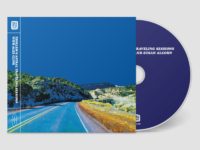To a lot of people, the slang to describe a remote location is ‘bum frick Egypt,’ but in Texas, that place is called Marfa. Situated almost 200 miles southeast of El Paso near Big Bend and well away from any major highways, this hamlet of less than two thousand residents in the Trans-Pecos high desert has paradoxically become a mecca for minimalist art. That drew in a certain visual artist from Chicago to hold an exhibit of his works at the Marfa Book Company.
But this visual artist is an audio artist aka musician, too. Meet Rob Mazurek, the composer, arranger, cornetist and electro-acoustic jazz pioneer.
So after the art exhibit of Mazurek’s creations called “Marfa Loops Shouts and Hollers” was held at the Book Company in January of 2016, a concert was performed by Mazurek along with Thollem McDonas whom he first met for this performance of experimental music spontaneously made up between them using a modified electric piano, analog effects, voice, modular synth, a sampler and, of course, a cornet. Blind Curves and Box Canyons (April 21, 2017, Relative Pitch Records) captures those first sparks between the two in Marfa.
The San Francisco native McDonas has worn a lot of hats in his life: as a child, he learned classical piano, improv and composing. He spent much of his young adult life in political activism and one of his current gigs is as lead singer of a protest punk band from Italy. It’s only fairly recently that this author, teacher, singer-songwriter and keyboardist had diversified into electronics but given everything he’s done up to now, it was a natural move for him.
The primary common denominator of these men whose paths hadn’t crossed until at this lonely outpost in West Texas is that improvisation is a primary passion. For McDonas, it was an opportunity to explore that passion with another master of creating art on the fly who comes from the jazz world (though Thollem had made a record with Nels Cline and William Parker not that long ago). Mazurek for his part got to go one-on-one with a keyboardist who likewise spent significant time in both the acoustic and non-acoustic realms relishing the challenge to reconcile the two.
Thollem’s fuzzed out and distorted electric piano makes the right companion to Mazurek’s analog synth as well as his horn. Those periodic flights from the latter’s cornet can quickly ground the assortment of crude electronic abrasiveness and odd sonorities in organic affection. A particularly graceful horn soliloquy during “Hollers” brings the point home.
Toward the end of “Shouts,” the electric piano/cornet dialog begins to resemble jazz, albeit of the avant-garde variety, and while most of the time, the emphasis is on creating texture and linear sonic progression, the influence of jazz does show up from time to time. Mazurek also makes use of his voice (perhaps even more than he’s ever done in the past) for roaring and wailing, another source of intonation and another piece of the puzzle that goes into this whole strange, evolving stew of sounds.
Following two twenty minute sonic odysseys “Shouts” and “Hollers” comes the expeditious “Howls,” which commences on Thollem’s extemporaneous single-note patterns that hints at flamenco and following a volley of artificially-produced percussive noises, evolves into a dense, quivering drone.
The sensation that comes from music so experimental and improvisational is amplified from this product being produced by the artists’ first encounter with each other. Blind Curves and Box Canyons has such rapport and symmetry that Thollem McDonas and Rob Mazurek must have surprised not just their audience but also themselves.
- Christian Marien Quartett – ‘How Long Is Now’ (2024) - April 18, 2024
- Dave Douglas, feat. James Brandon Lewis – ‘Gifts’ (2024) - April 11, 2024
- Thollem – ‘Worlds In A Life, Two’ (2024) - April 8, 2024



